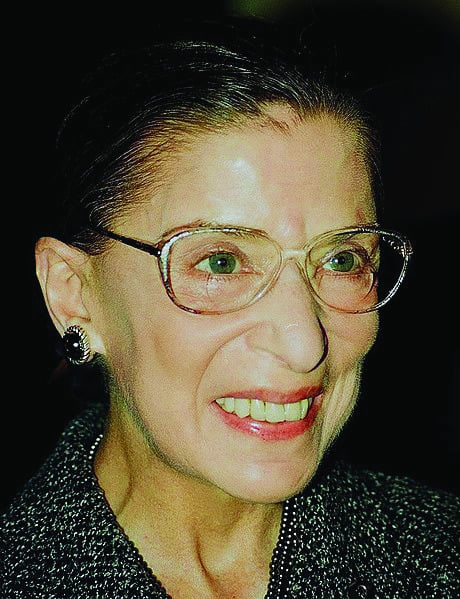Ruth Bader Ginsburg leaves behind complex legacy

Celebrated jurist dead at 87
On Friday, September 18, United States Supreme Court Justice Ruth Bader Ginsburg died at the age of 87. Ginsburg had been undergoing treatment for pancreatic cancer since 2009. In the years since the 2016 election of Donald Trump, observing the liberal jurist’s health had become something of a spectator sport, with observers on both the right and the left recognizing that Ginsburg’s departure from the Supreme Court would give Trump a third appointment, tilting the highest court in the land even further to the right. With Ginsburg’s death, the Supreme Court has only three liberal justices, Elena Kagan, Sonya Sotomayor, and Stephen Breyer, who, at 82, is now the oldest sitting justice. Trump has said he will nominate a successor to Ginsburg by the end of the week and Senate Majority Leader Mitch McConnell has said he will move to confirm the nominee. The decision, while not unsurprising, has stirred controversy as McConnell blocked Obama’s nomination of Merrick Garland to the Supreme Court in 2015 following the death of conservative justice Antonin Scalia, saying that it was too close to an election and that the American people should decide. Scalia died in February 2016, almost one full year before Obama’s replacement would be sworn in. The decision over who will replace her is, repulsively, being made over Ginsburg’s dead body, which will lie in repose in the U.S. Capitol on Wednesday and Thursday.
Days before her death, Ginsburg told her granddaughter that her “most fervent wish” was that she would not be replaced until a new president took office. Some observers have condemned Ginsburg’s decision not to retire under Obama and ensure another, younger, liberal justice could take the bench. And while there are deeper questions to be asked – like whether lifetime appointments are compatible with democracy, or whether you can call a country whose fate is so bound up in the retirement decisions of a lone person a democracy in the first place – her choice not to retire while a Democrat was in office will certainly become a part of her legacy. In 2005, the socialist historian and author of A People’s History of the United States, Howard Zinn, wrote that people shouldn’t despair over the Supreme Court, as “it would be naive to depend on the Supreme Court to defend the rights of poor people, women, people of color, dissenters of all kinds.” And while Zinn is right that justice never comes from above, it would be wrong to pretend that Ginsburg’s death, and the timing of it, are without profound consequences.
Ginsburg’s legacy on the bench is often framed in terms of her (white) womanhood, in part because the legacy of anyone who isn’t a white man is framed by their otherness and in part because Ginsburg herself made a point of putting an end to gender–based discrimination in law a keystone of her career, like when she joined the majority in striking down Texas’ anti-abortion omnibus bill Whole Woman’s Health v. Hellerstedt or when she issued the dissent in Ledbetter v Goodyear Tire & Rubber Company, which would eventually lead to the Lilly Ledbetter Fair Pay Act – Obama’s first bill as President. And indeed, the loss of Ginsburg will have serious consequences for women in particular, and for people who can become pregnant in general. Although Trump has said he will appoint a woman to replace Ginsburg, the mere fact of being a woman doesn’t mean that one will be a defender of the rights of women, particularly when it comes to reproductive, racial, and economic justice. A sixth conservative justice, woman or no, could mean the end of Roe v. Wade, the law that has protected a pregnant person’s right to access an abortion in the United States since 1973, as well as more attacks on voting rights and labour.
Ginsburg was a staunch defender of the Voting Rights Act, which was “gutted” by the conservative court in 2013, provoking what was likely her most famous dissent. But her record on racial justice, and in particular justice for victims of police brutality and police overreach – who are all too often racialized – is deserving of scrutiny. During her time on the Supreme Court, Ginsburg tended towards rulings that favoured the police, like Heien v. North Carolina, which saw a Hispanic man arrested and sentenced to jail time after being found with drugs following an unlawful traffic stop. She also infamously called Colin Kaepernick’s protests against police brutality “arrogant” and “dumb,” for which she later apologized. And despite being a defender of affirmative action on the bench, during the long course of her career she hired only one Black clerk – a man – for which she never apologized.
Her record on Indigenous issues is similarly ambiguous. Ginsburg delivered the majority opinion in the City of Sherrill v. Oneida Indian Nation of New York, in which the Oneida Nation, which had been buying back land that had been ceded under coercive pressure in the early 1800s and claimed that land to be tribal land and therefore exempt from state and city taxes and subject to tribal governance, was taken to court by the city of Sherrill. The case made its way to the Supreme Court, which ruled against the Oneida, and Ginsburg wrote that the Oneida had “relinquished governmental reins and could not regain them through open–market purchases from current titleholders,” essentially denying the sovereignty of the Oneida people and forcing them into a paternalistic arrangement with the US Department of the Interior, a decision to uphold the doctrine of discovery that some say she regretted. At other points, Ginsburg would side with the majority opinion in the 2020 case McGirt v. Oklahoma, which saw half of Oklahoma recognized as “Indian Country” and restored to the Creek people, as well as the 2001 decision which upheld the right of the Coeur d’Alene (Schitsu’umsh) people to the southern portion of Lake Coeur d’Alene in Idaho.
The loss of Ginsburg looms large over the coming November election, in part because her death will give Trump an additional pick for the court, and in part because the last time an election was as contested as this one has the potential to be – in 2000, when the court ended a recount in Florida, effectively handing George W. Bush the presidency – it was Ginsburg who wrote the dissent. Without her – and with Trump falsely claiming that mail in ballots are prone to fraud – it’s possible that if Biden wins and Trump refuses to accept the results, a conservative court could rule in his favour. It is unfortunate that the moment of her death should be so fraught with consequences, as this should be a moment of solemn reflection upon a life and legacy that, while complex and limited by its respect for colonial institutions, was nevertheless formidable, worthy of mourning and worthy of dissent.









